Waters
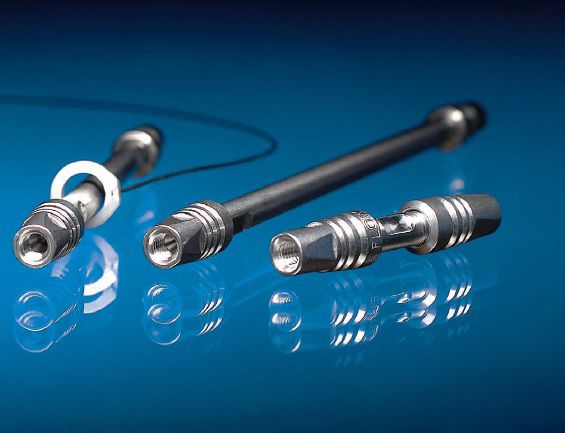
Waters
HSS (High Strength Silica)Technology
High pore volume HPLC particles do not possess the mechanical stability necessary to withstand the high pressures inherent of UPLC® separations. This mechanical limitation led Waters material scientists to develop a silica particle designed for high mechancial stability and appropriate morphology necessary to provide long column lifetimes and UPLC efficiencies at high pressures. The 1.8 µm High Strength Silica (HSS) particle is the first and only 100% silica particle designed, tested and intended for use in applications up tp 15,000 psi [1034 bar].
HSS particle technology is also available in HPLC particle sizes [3.5 and 5 µm] in the HSS family of HPLC columns, enabling seamless transfer between HPLC and UPLC technology platforms.
Designing and Testing Pressure-tolerant UPLC Particles
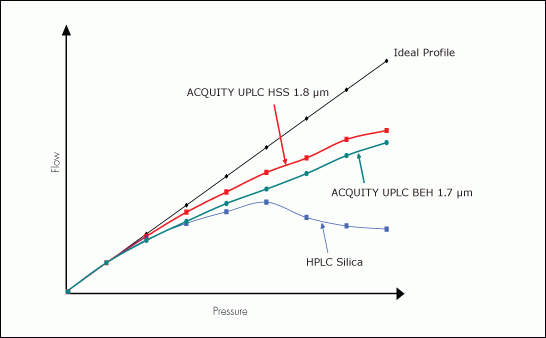
In this proprietary Waters particle strength test, chromatographic particles are packed into a column and mobile-phase flow is applied. As pressure increases, the particles are crushed, thereby restricting flow. The degree of deviation from the Ideal Profile line indicates particle fragility/strength. Waters BEH and HSS particles are two of the strongest chromatographic porous particles commercially available.
ACQUITY UPLC HSS C18 Columns
The ACQUITY UPLC® HSS C18 stationary phase features a tri-functionally bonded C18 ligand and proprietary endcapping process that not only yields superior peak shapes for bases at neutral pH, but also resists acid hydrolysis, thus providing extremely long lifetimes at low pH. Since the HSS particle is 100% silica, the ACQUITY UPLC HSS C18 chemistry is designed to work and excel under demanding highly acidic conditions.
The ability to reliably operate at low pH [i.e., < pH 2] is important because pH manipulation is a key tool in controlling and manipulating selectivities of ionizable compounds during method development. The ACQUITY UPLC HSS C18 packing is the most stable bonded phase commercially available and does not suffer form peak shape issues that plague older stationary phases that rely upon steric protection [and lack of endcapping] to produce stability at low pH.
ACQUITY UPLC HSS C18 Columns Resist Acid Hydrolysis at Low pH
Low-pH Stability: 21 hr Exposure to 0.5% TFA at 60 °C
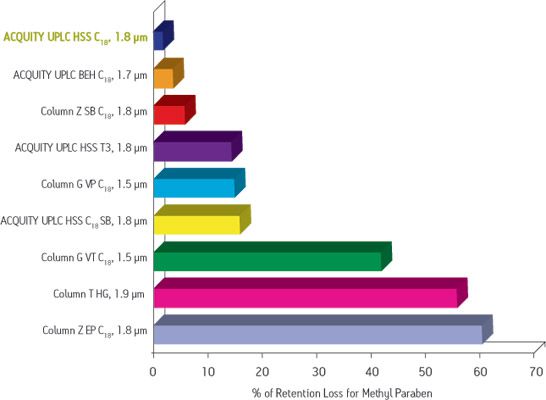
In this test, the loss in retention of the neutral marker methyl paraben indicates bonded stationary phase loss due to acid hyrolysis. ACQUITY UPLC HSS C18 columns resist bonded phase loss due to novel bonding and endcapping processes.
ACQUITY UPLC HSS C18 SB Columns
ACQUITY UPLC® HSS C18 SB columns are designed specifically for chromatographers who routinely screen and categorize UPLC® column chemistries as part of their method development protocols. Intended for low pH separations which contain complex mixtures of basic and non-basic compunds, ACQUITY UPLC HSS C18 SB columns can produce separations that will be quite different in terms of selectivity as compared to those of most modern, high-coverage fully end-capped C18 stationary phases.
How was this accomplished? Waters materials scientists bonded a trifunctional C18 ligand at an intermediate ligand density [i.e., 1.6 µmol/m2] without endcapping. In general, the higher silanophilic activity will promote greater retention for basic compounds whereas the intermediate C18-ligand density will produce slightly shorter [or equivalent] retention for non-basic compounds as compared to most modern high coverage, fully end-capped C18 stationary phases. Chromatographically, this unique combination will provide a practical method development tool for complex UPLC separations.
Fast Separations of Tricyclic Antidepressants
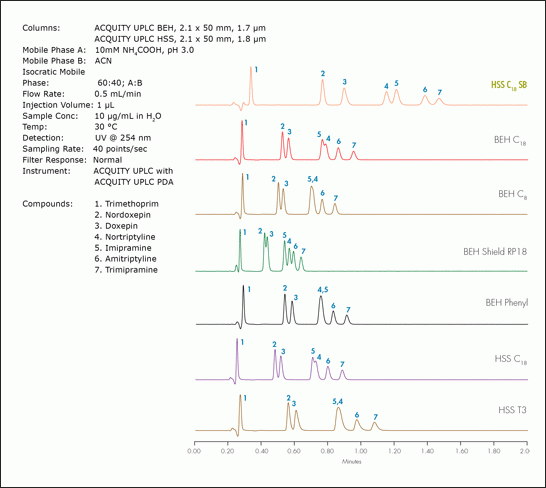
Tricyclic antidepressants [TCAs] are secondary and tertiary amines and were commonly prescribed to patients suffering from depression or other conditions. TCAs are being replaced by selective serotonin reuptake inhibitors (SSRIs). ACQUITY UPLC HSS C18 SB columns retain basic compounds such as tricyclic antidepressants longer than fully endcapped stationary phases due to the enhanced silanol activity on the non-endcapped HSS particle.
ACQUITY UPLC HSS T3 Columns
ACQUITY UPLC® HSS T3 columns utilize Waters innovative and proprietary T3 bonding. This is the same advanced bonding process that is behind the industry-leading polar-compound retention, aqueous mobile-phase compatibility and ultra-low MS bleed of Atlantis® T3 HPLC columns. T3 bonding utilizes a trifunctional C18 alkyl phase bonded at a ligand density that promotes polar compound retention and aqueous mobile-phase compatibility. The T3 endcapping is much more effective than traditional trimethyl silane [TMS] end-capping. This unique combination of bonding and endcapping provides superior polar compound retention and aqueous compatibility while also enhancing column performance, lifetime, peak shape and stability.
Although the rugged and efficient ACQUITY UPLC BEH particle provides a wide pH range and superior peak shapes, its hydrophilic nature does not promote polar compound retention. ACQUITY UPLC HSS T3 columns are designed to retain and separate polar organic compounds in reversed-phase UPLC® separations. When compared to ACQUITY UPLC BEH C18 columns, most compounds are more strongly retained on ACQUITY UPLC HSS T3 columns.
Superior Retention of Polar Compounds
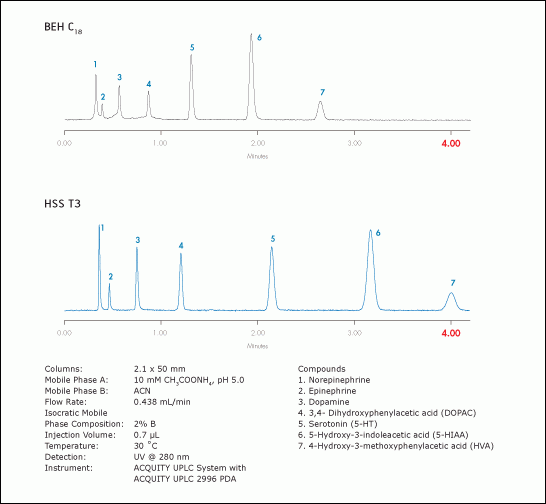
ACQUITY UPLC HSS T3 columns retain polar compounds longer than ACQUITY UPLC BEH C18 columns and contain one of the most retentive sub-2 µm column chemistries commercially available.
게시물수정
게시물 수정을 위해 비밀번호를 입력해주세요.
댓글삭제게시물삭제
게시물 삭제를 위해 비밀번호를 입력해주세요.
